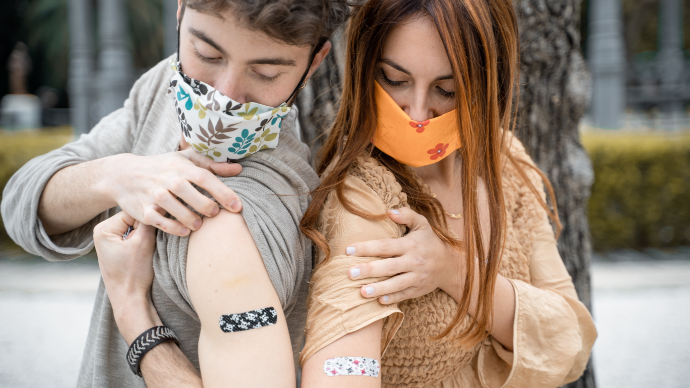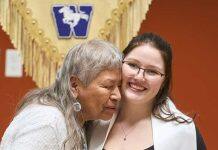

A Q&A with UChicago Medicine infectious disease specialist Jennifer Pisano
The Centers for Disease Control announced that in most cases, vaccinated adults in the U.S. could start going without masks, even indoors — a long-awaited benchmark to signal a return to a more normal life. But many people still have lingering questions about the COVID-19 vaccines and whether or not they’re needed, especially if you’ve already had COVID-19.
Jennifer Pisano is an Associate Professor of Medicine in Infectious Diseases at the University of Chicago. She serves as medical director of antimicrobial stewardship and infection control at the University of Chicago Medicine.
“As an infectious diseases expert and someone who contracted COVID-19 myself, I’m here to share my insights,” said Pisano.
I’m young and healthy and I haven’t caught COVID yet. Do I need to get a vaccine?
Yes, absolutely. The SARS-CoV-2 virus is still circulating in our communities, and we haven’t reached herd-immunity levels of vaccination yet. Even if you are young and don’t have any underlying health conditions that would put you at extra risk, the way individual people respond to COVID-19 is unpredictable — that’s part of what makes it so dangerous.
In almost every case, I would recommend getting vaccinated. It protects not only you, but also those who are close to you and the people you love. If you don’t want to get it for your own protection, get it for them.
Do I still need the vaccine if I’ve already had COVID-19?
Absolutely. While we know recovering from a COVID-19 infection means you will have circulating antibodies in your system, we are still learning about how the immune system handles the antibody response after a natural infection. We’re not sure how protective the antibodies are from different kinds of infections — such as an asymptomatic infection versus a symptomatic infection. With vaccination, we know that people with healthy immune systems are getting a great antibody response. So I would recommend vaccination even after a COVID-19 infection to get the best protection.
On top of that, if you live with people who are at higher risk of severe infection or may not develop a strong antibody level after vaccination, getting your own COVID-19 vaccination may make it less likely that you will transmit the virus to them.
When should I get vaccinated after having COVID-19?
The current guidance says that as long as you are no longer at risk of exposing other people to the virus, you can get your vaccine at any time. That means that once you are no longer in isolation and are no longer infectious, any time is fine.
The exception is for people who received monoclonal antibodies as part of their COVID-19 treatment. The current recommendation is that these patients wait at least 90 days after their treatment to be vaccinated, because they will already have COVID-19 antibodies circulating in their system and we just don’t know enough about the virus or its antibodies to know if this particular treatment could interfere with the vaccine’s effectiveness.
Is it better to gain immunity through exposure to COVID-19 or through a vaccine?
With some viruses, such as chicken pox, being infected with the virus itself grants stronger immune protection than the chicken pox vaccine; however, in those cases, you then have to deal with all the complications of having the virus. When it comes to COVID-19, it’s really hard to know whether being exposed to the virus is more protective of future infection than the vaccine, simply because we don’t know the SARS-CoV-2 virus well enough yet.
With natural immunity, which is the protection we get after being infected with a virus, the immune response can be variable. For example: the number of antibodies your body produces may depend on how much of the virus you’re exposed to. And there is likely beneficial variation in the types of antibodies being produced. The vaccinations currently available in the U.S. have been shown to effectively stimulate antibodies against the virus’ spike protein. New vaccines are being created that make antibodies to other parts of the virus as well. Both immunity from natural infection and vaccination stimulate a T-cell response that will hopefully provide you with protection from the virus for a longer time.
While it’s possible some people may have a higher antibody response after a natural infection than they would after vaccination, we’re still learning about this new virus, and we don’t know how protective natural immunity really is, especially when there is such a continuum of different types of infections. We don’t have clear data on how antibody responses from a mild infection compare to a severe infection, or how protective those antibody responses are.
On the other hand, we doknow that the vaccine is very protective. In most people, getting vaccinated generates a lot of antibodies. So far, the vaccines appear to be incredibly effective, especially when it comes to preventing severe infections, hospitalizations and death.
Is there any extra risk if I get the vaccine after having had COVID-19?
There are a lot of anecdotal reports that many people who have had COVID-19 experience stronger side effects after their first vaccine dose, while most people who have never had COVID-19 have a stronger response after the second dose. But each person’s experience is unique. Different people have different side effects and some people who haven’t had COVID-19 report very strong side effects, too.
It’s also important to note that it’s possible many people who are being vaccinated were exposed to COVID-19 and had an asymptomatic infection without realizing it, which could contribute to the variation in side effects.
Personally, I found the side effects of my first vaccine to be pretty strong — it felt like I had COVID-19 again — but this time without the scary cough and shortness of breath. I had a high fever, chills and muscle aches, but it was not as overwhelming as I had feared. After a day or two, I was back to normal, and the side effects were certainly easier to manage than being sick with COVID-19. It was helpful to expect the side effects and to know my immune system was getting a boost. I was lucky to be able to plan to spend a day or two in bed. After my second vaccine, I just had a sore arm.
Can I still get COVID-19 after having the vaccine?
Yes, you can still get COVID-19 after getting the vaccine. In fact, we’re sometimes seeing people pop up with reinfections. In the majority of cases, these are people who are being screened asymptomatically and just happen to be positive for the virus, or who show mild symptoms of the virus. The vaccine is intended to prevent severe infections and hospitalizations and it’s doing an excellent job!
We can predict who might not have the best immune response to the vaccine — these are usually people who have other health conditions affecting the strength of their immune system, such as organ transplants or cancer. These people are likely to have already been taking precautions to prevent illness even before the pandemic and will most benefit from continuing to follow other guidance on preventing COVID-19 even after their vaccination, such as mask wearing and social distancing.
We also think that the amount of virus a person is exposed to can influence the severity of infection. So even as masking guidance changes and people start gathering in larger crowds again, individuals should be aware of their own comfort levels and remember that even after vaccination, there is still some risk of possible infection.
I’m still nervous!
I understand. I was nervous about getting my vaccine, too! After dealing with COVID-19, I was worried about the possible side effects, and the clinical trials hadn’t really looked at whether there were any extra risks to getting the vaccine if a person already had the virus. But when my ticket came up, I decided to get my vaccine. I knew that it would give me more protection in the long term, and I had other personal reasons, too.
I wanted to feel comfortable seeing my parents again — to spend time with my family and not worry about spreading the virus. I recently had the one-year anniversary of my COVID-19 diagnosis, and I get a little emotional to think about how far we’ve come. To think that we’re able to start seeing people in person again, thanks to these vaccines.
I am grateful to have had the opportunity to be vaccinated, and I hope that my patients will choose to be vaccinated, too.







































